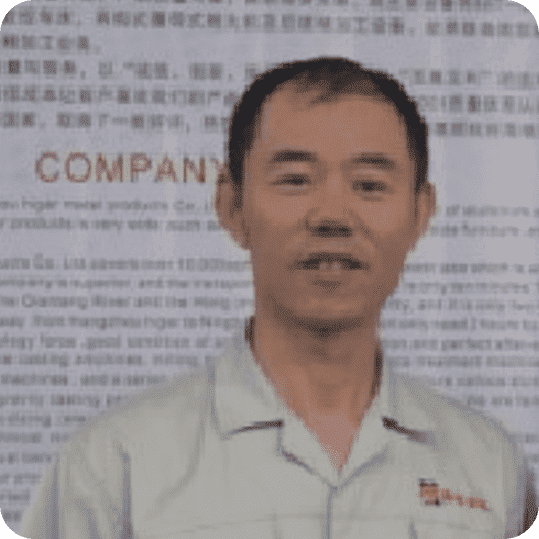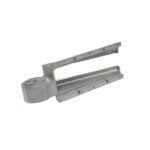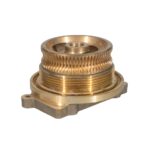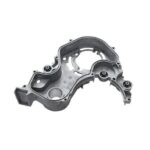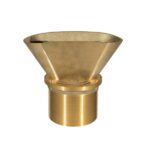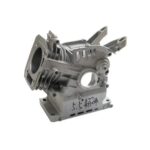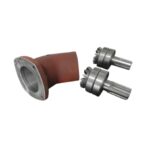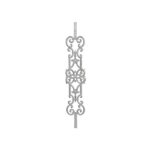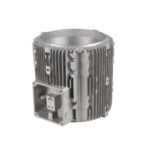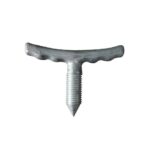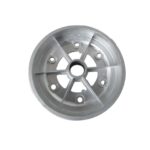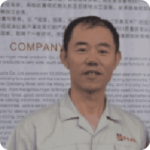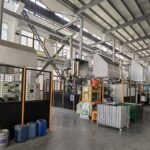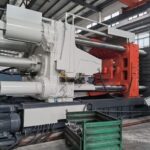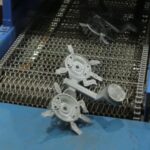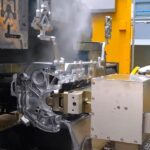Introduction
Aluminum die casting is a fundamental manufacturing process known for creating intricate, lightweight, and durable components.
Industries such as automotive, aerospace, and consumer goods rely heavily on die casting for precision and efficiency.
This guide delves into aluminum die casting alloys, offering insights into their properties, applications, and a comprehensive alloy comparison table for 2024.
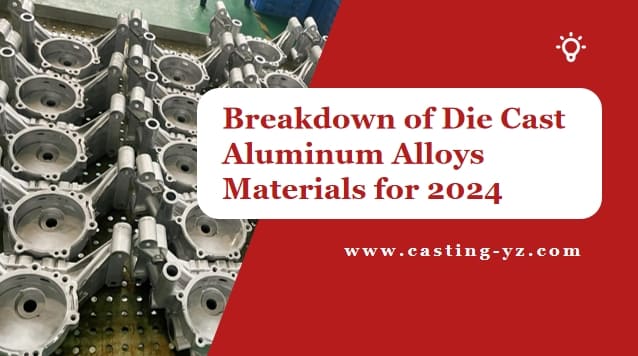
Key Properties of Aluminum Die Casting Alloys
Aluminum die casting alloys possess unique characteristics that make them indispensable in modern manufacturing.
Strength-to-Weight Ratio
Aluminum offers exceptional strength while being significantly lighter than steel, making it a go-to material for applications demanding weight reduction, such as vehicles and aircraft.
Corrosion Resistance
Many aluminum alloys naturally resist oxidation and corrosion, ensuring long-lasting performance in harsh environments like marine or aerospace applications.
Thermal and Electrical Conductivity
Aluminum’s excellent conductivity makes it suitable for heat sinks in electronics and electrical housings, enabling efficient thermal management and energy transmission.
Recyclability
Over 70% of all aluminum ever produced remains in use today. This high recyclability supports sustainability in manufacturing processes, reducing waste and conserving resources.
Searching for High-Quality for Cast Aluminum Parts?
You’ve come to the right place! Yongzhu Casting is a certified die casting manufacturer with over 20 years of expertise in the industry.
We have successfully completed numerous die casting projects for Aluminum casting parts, particularly in your industry.

Zhejiang Yongzhu Casting Technology Co., Ltd.
Location: Zhejiang, Shaoxing
Company type: Manufacturing
Year Founded: 2004
Main Products: Aluminium die casting, Mold Making, Die Casting, Sand Casting, Gravity Casting
Leading Chinese producer Yongzhu Casting is formerly known as Hangzhou Higer Metal Products Co., Ltd., was established in 2004.
With 20 years of experience in the industry, we are a specialized manufacturer in Aluminum casting and Machining.
Our products are widely used in various applications such as Automotive, Energy, Lighting, Medical, Home Furnishings, Machinery & Equipment etc. Below is one of our products.
It’s worth mentioning that the evolution of rapid logistics has transformed how industries approach purchasing. Aluminum casting orders can now be sourced from overseas suppliers efficiently.
For instance, working with YONGZHU CASTING, you can inquire, order, and even find better value than your local options—all while maintaining assured quality.
Design Review & DFM Support
Our professionals will evaluate your designs and provide suggestions for cost savings. Additionally, we offer Design for Manufacturing (DFM) assistance and conduct mold flow analyses to facilitate efficient production.
State-of-the-Art Manufacturing Equipment
Our facility is equipped with advanced hot-chamber and cold-chamber die casting machinery for aluminum and zinc production.
We also utilize high-precision CNC machines in a temperature-controlled workshop, featuring 3-Axis, 4-Axis and 5-Axis setups to manage any project you have.
Rigorous Quality Control Measures
Our dedicated quality control team ensures that all parts meet the highest standards of quality and consistency. We employ high-accuracy measurement instruments, including CMM, spectrometers, and X-ray detectors.
Comprehensive Surface Treatment Options
We provide a variety of surface finishing techniques for your precision die casting components. Our in-house services include cleaning, polishing, anodizing, shot blasting, and painting.
Flexible Project Acceptance
While larger manufacturers often shy away from low-volume projects, and smaller ones may struggle with quality, Yongzhu Casting stands apart. We prioritize customer satisfaction and willingly accept high-mix, low-volume projects like yours.

Advantages of Aluminum Die Casting
- Dimensional Precision: High accuracy eliminates extensive machining post-casting.
- Cost-Efficiency: High production rates reduce unit costs for large-scale operations.
- Versatility: Suited for automotive parts, aerospace components, and more.
Alloy Comparison Table
Below is a detailed comparison of key aluminum die casting alloys.
| Alloy | Key Properties | Applications | Advantages | Disadvantages |
|---|---|---|---|---|
| A356 | High strength, good ductility | Engine blocks, brackets, housings | Widely available, pressure tight | Moderate corrosion resistance |
| A380 | Excellent fluidity, pressure tightness | Transmission cases, housings, engine parts | High dimensional accuracy, good pressure tightness | Lower strength than Al-Cu alloys |
| A413 | High pressure resistance, machinability | Hydraulic valves, pumps, housings | Exceptional pressure tightness | Reduced strength compared to some alloys |
| B390 | Very high strength, hardness | Pistons, cylinder heads | Superior wear resistance, ideal for high-stress parts | Low ductility, limited corrosion resistance |
| K-Alloy | High corrosion resistance, lightweight | Marine components, harsh environments | Exceptional durability in extreme conditions | Limited availability, higher cost |
Applications of Aluminum Die Casting
Automotive Industry
Aluminum die casting enables the production of lightweight yet strong components such as transmission housings, engine blocks, and wheels. By reducing vehicle weight, aluminum contributes to improved fuel efficiency and reduced emissions.
Aerospace Industry
In aerospace, aluminum alloys like AM508 are crucial for components such as landing gear, airframes, and structural parts, where strength and lightweighting are essential.
Electronics and Consumer Goods
Die-cast aluminum provides excellent thermal management in heat sinks and electrical housings, ensuring the durability and efficiency of electronic devices.
Key Considerations When Choosing an Alloy
- Strength Requirements: Match the alloy to the mechanical demands of the application.
- Corrosion Resistance: For harsh environments, opt for alloys like K-Alloy or Al-Mg.
- Thermal Properties: High conductivity alloys are ideal for heat dissipation.
- Cost and Availability: Balance the alloy’s performance against project budgets.
- Machinability: Ensure the alloy allows for easy finishing and post-processing.
Comparison of Casting Methods
| Feature | Die Casting | Sand Casting | Investment Casting |
|---|---|---|---|
| Mold Material | Reusable steel | Expendable sand | Ceramic shells |
| Process Speed | High | Moderate | Slow |
| Production Volume | High | Low to moderate | Low |
| Dimensional Accuracy | High | Moderate | High |
| Surface Finish | Smooth | Rough | Smooth |
| Material Options | Limited (Al, Zn, Mg) | Wide range | Wide range |
| Cost per Part | Low (high initial mold cost) | Moderate | High |
| Typical Applications | Automotive, consumer goods | Engine blocks, housings | Jewelry, medical implants |
Conclusion
Aluminum die casting continues to be a cornerstone of precision manufacturing, offering unmatched versatility, efficiency, and performance.
By understanding the nuances of various alloys and their applications, manufacturers and engineers can make informed decisions to optimize their projects for success.
FAQs
- What is the most common aluminum alloy for die casting?
A380 is widely used due to its excellent fluidity, dimensional accuracy, and pressure tightness, making it ideal for automotive and industrial components. - Can aluminum die-cast parts be welded?
Welding is possible but challenging due to porosity. Alloys like A356 offer better weldability compared to others. - What makes K-Alloy unique in die casting?
K-Alloy is known for its exceptional corrosion resistance, making it ideal for marine applications and harsh environments. - How does die casting compare to sand casting?
Die casting offers better precision, surface finish, and production speed, while sand casting is more flexible for large, low-volume parts. - Are all aluminum alloys recyclable?
Yes, most aluminum alloys are recyclable, contributing to sustainable manufacturing practices. - What is the lead time for die-cast aluminum parts?
Lead times vary but are generally shorter than other methods due to the high-speed production capabilities of die casting. - Which alloy is best for high-stress applications?
B390, with its high strength and hardness, is ideal for parts subjected to extreme stress, such as pistons and cylinder heads. - Why is aluminum preferred in automotive casting?
Its lightweight nature reduces vehicle weight, improves fuel efficiency, and provides sufficient strength for structural components. - What factors influence the cost of die casting?
Mold complexity, production volume, and alloy selection are key cost factors. - Can aluminum die-cast parts have surface coatings?
Yes, coatings like anodizing, painting, and powder coating enhance corrosion resistance and aesthetics.

